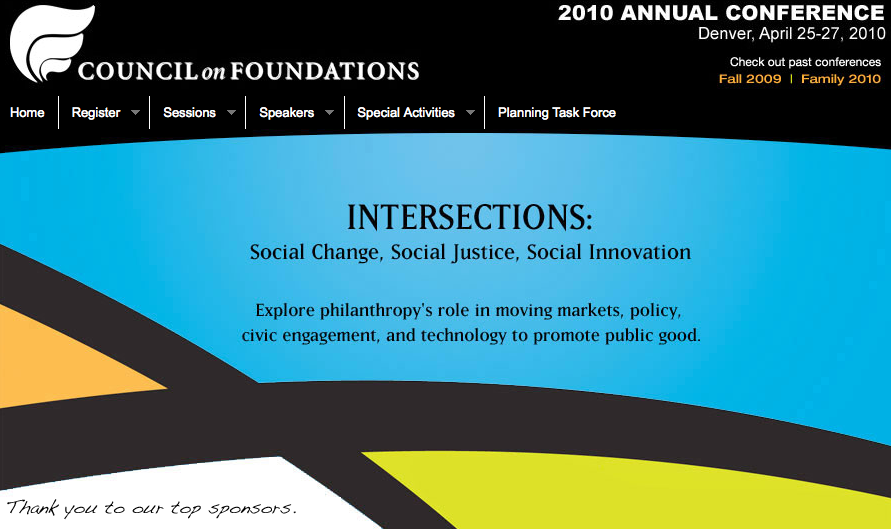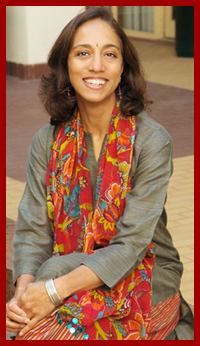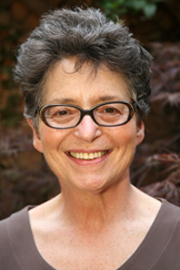What do change, justice, and innovation have in common? The “social” part, of course...
“Intersections: Social Change, Social Justice, and Social Innovation”—this was the theme of this year’s Council on Foundations gathering in Denver, which just ended yesterday.
It’s a welcome theme from my perspective—very aligned with the work of the Firelight Foundation and its partners.  And the Council on Foundations, America’s premier philanthropic association, has delivered solidly on this theme, including a real recognition of the importance of getting resources to the grassroots.
And the Council on Foundations, America’s premier philanthropic association, has delivered solidly on this theme, including a real recognition of the importance of getting resources to the grassroots.
Valerie Jarrett, senior advisor to President Obama in the area of public engagement, was one of the featured speakers at the conference. She noted that the US government has been trying to engage philanthropy in new ways to work collaboratively.
The White House has established a social innovation fund that will work through foundations and other nonprofit grantmakers to identify promising approaches that the government would be unlikely to come up with.
Jarrett recounted that when she had been involved in Chicago city government and had been a recipient of federal funding, she used to ask in frustration, “Why can't the federal government fund the programs that communities need?” Now the shoe is on the other foot, and she is aware both of the challenge and of the possibility.
The conference, in fact, honored two wonderful examples of philanthropists “funding the programs that communities need.”
The first was the Robert W. Scrivner Award for Creative Grantmaking, which was awarded this year to Kavita Ramdas, the president and CEO of the Global Fund for Women (GFW) based in San Francisco. GFW is the world’s largest public foundation focused exclusively on advocating and funding women’s human rights globally.
Since 1996, Kavita has led and expanded the impact of this international network—founded in 1987—which has made small grants to thousands of women’s groups in nearly 170 countries that are finding innovative solutions to the persistent problems of health, poverty, violence, and discrimination.
The founding story of the Global Fund for Women is told in the book Paradigm Found, written by Kavita’s predecessor Anne Firth Murray. It eloquently explains the philosophy of grassroots grantmaking, which underlies our entire approach at Firelight.
We at Firelight are great admirers of the Global Fund for Women and of Kavita, and congratulate her warmly on this award.
A second grassroots funder was also honored. Barbara Dobkin, the chair of the board of American Jewish World Service and a noted philanthropist in her own right, was honored with a LEAD award for her grantmaking to women and girls. The LEAD award celebrates outstanding risk-takers and innovators in the philanthropic community whose determination and leadership have increased funding for programs that promote gender equity and diversity.
Barbara has created and funded innovative programs serving women and girls globally and has encouraged women of wealth to strengthen their role as philanthropic leaders and advance causes for women, children, and families.
Barbara describes herself as “a retiring woman by nature”, but as she had the microphone, she very forthrightly underlined two important points to the audience of 1,400 foundation leaders.
First, even though times have been hard, she urged, let’s not reduce the amounts of our grantmaking—because if we, as foundations, have seen financial difficulties, we can only imagine the hardships that our grantee organizations and their beneficiaries face, and the difference our funding can make.
Secondly, she said, let’s get more money out, in modest amounts but lots of it, as directly as possible to women and girls, for sound, prudent use that will benefit the most disadvantaged.
She got a standing ovation.
 American Jewish World Service (AJWS), like the Global Fund for Women, is partnering with Firelight and three other organizations (the Global Fund for Children, EMPower, and Mama Cash) in the “Grassroots Girls Initiative”, funded by the Nike Foundation. As partners in the Initiative, we all provide grant support to grassroots organizations working to empower adolescent girls.
American Jewish World Service (AJWS), like the Global Fund for Women, is partnering with Firelight and three other organizations (the Global Fund for Children, EMPower, and Mama Cash) in the “Grassroots Girls Initiative”, funded by the Nike Foundation. As partners in the Initiative, we all provide grant support to grassroots organizations working to empower adolescent girls.
While Firelight, like AJWS, is not solely focused on women and girls, we have a strong belief in girls’ and women’s equal right to development and opportunity, and in their pivotal role in improving the well-being of society as a whole. Firelight’s approach is to ask community-based organizations and leaders to understand and articulate the obstacles to gender equality, and to find ways to overcome them.
At this conference, there was also a strong recognition that community-based efforts need to be linked to macro-level solutions. Al Gore’s resoundingly motivating plenary speech on the need for all hands on deck on climate change made us all consider our responsibilities in this vast arena.
I’ve been thinking about how Firelight could help its grantee-partners better inform and equip themselves to face this issue at their own local and national levels. Because it’s certain that, once the climate changes, those in the most vulnerable areas and situations are likely to suffer the most.
I left the conference feeling hopeful about the year ahead in philanthropy and honored to be associated with committed individuals like Kavita and Barbara, and with the powerful organizations they lead. May their work thrive and many thousands of women and girls, men and boys, continue to benefit.




